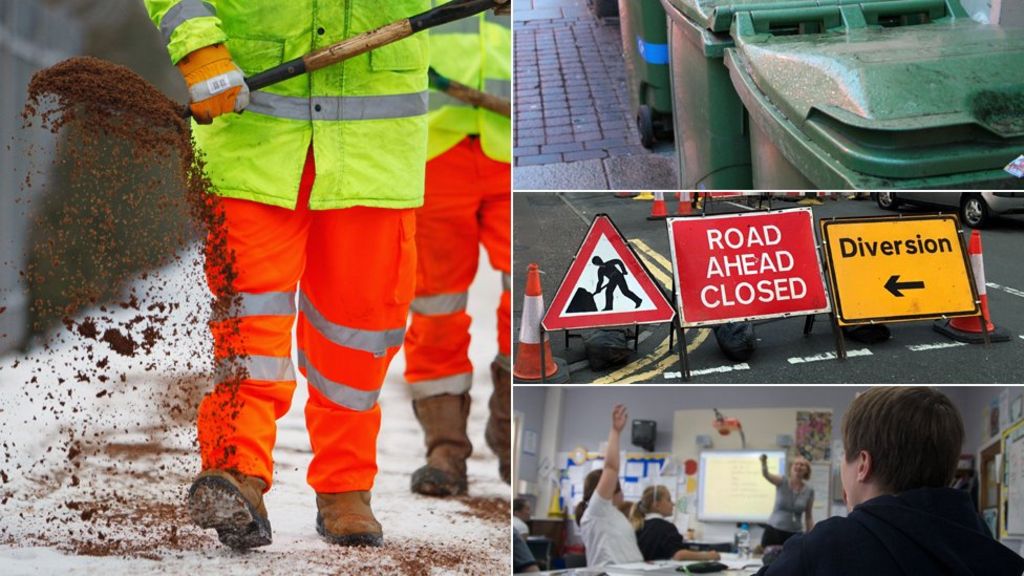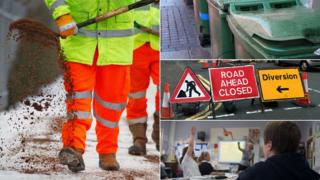Most councils ‘set for Scottish government cash rise’ – BBC News


More than half of Scotland’s councils are set for an increase in the amount of money they receive from the government, the BBC has found.
Analysis by BBC Scotland suggests 17 of the country’s 32 councils would see headline increases.
Four would receive virtually unchanged amounts.
But the money includes their share of 120m which will need to go straight to head teachers through a new government scheme.
The headline totals also include grants being given to councils as part of the proposed settlement.
Local government finance is complicated and councils are heavily dependent on the Scottish government for cash.
In many cases, councils that receive more money in total from the government may still have less, which they can decide how to use.
Nationally, the basic amount of money being given by the government to Scotland’s 32 councils – the revenue budget – will fall from 9.693bn this year to 9.496bn next year.
But this is not the final total. Once certain grant funding is included in the equation, the government proposes to give councils more than 10bn.
Analysis by BBC Scotland local government correspondent Jamie McIvor
 Image copyright NASA
Image copyright NASA Many councils will get more government cash in total but many of those councils claim they are still facing cuts. So who’s right?
Actually both the government and councils are telling the truth.
One reason for the difference is that there will be less available in many areas for ongoing commitments.
The overall core funding given by the government to councils across Scotland will fall – but the way the cash is distributed means some will get more or less than this year.
A total of 120m of that core funding has to be given to head teachers – effectively meaning even less of the core funding can be spent in the way a council may choose.
But when councils talk of cuts they do not necessarily mean absolute reductions in the amount they get from government.
They may look for savings in one area to help protect spending somewhere else – perhaps in a service where demand or costs are rising. The issue here is how little control some councils feel they have over the amount in the kitty.
But ultimately, the issue for voters is the overall size of their council’s budget and how they spend the cash.
Voters in next May’s council elections will be interested in their local situation – not what is happening in 31 other areas.
So are their local services facing cuts? Is their local council tax going up? Is the local council being run as effectively as possible.
The government argues more will be available for local services overall – especially once changes to council tax bands and possible local rises are included.
There will be 32 different debates in local spending priorities. But details of just how much the government is giving and what is, or is not, ring-fenced could help colour an informed debate.
The government also argues that more cash overall will be available for local services once other sources of money are included too: 107m to ensure all staff working in social care partnerships are paid the living wage and 111m from changes to council tax bands.
Government critics may argue that this means a comparison with last year is unfair, as some who gain overall may still receive less for ongoing activities.
Complex formula
A complex formula is used to work out how the government money is distributed between councils – hence why some will get more and others will get less than this year.
Councils which could get more, if the funding deal is accepted, include Glasgow, Fife and West Dunbartonshire. The 11 which could get less include Aberdeen City, Angus and Argyll and Bute.
The council tax currently makes up about 15% of a typical council’s income.
 Image copyright Thinkstock
Image copyright Thinkstock From April, bills for all council tax payers in Bands E,F,G and H properties will rise automatically through changes to the relationships between property bands.
Councils will also be able to put up council tax for everyone by up to 3%. So far only Scottish Borders has confirmed it plans to do this, while South Lanarkshire intends to freeze bills again.
There is speculation that a number of other councils will also consider a continuation of the freeze.
Fife and Glasgow have both publicly argued that, between them, they would still have to make savings of 90m next year. They have never claimed that this was because they would receive 90m less in total from the government.
One reason why councils are still looking at cuts and savings is that the cost of providing individual services may rise – perhaps through increasing demand – so savings may need to be made in one area to provide more cash for another.
Local government organisation Cosla and individual councils are set to discuss the government’s offer in the coming days and weeks.
Most councils will decide on their local spending – and whether to raise the local council tax – in February.